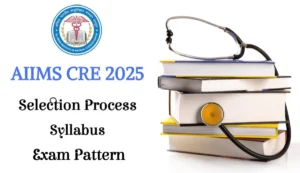The All India Institute of Medical Sciences (AIIMS) has announced the Common Recruitment Examination (CRE) 2025 for filling thousands of Group B and Group C posts across multiple AIIMS institutes.
With over 3,000+ vacancies, this national-level recruitment drive offers a golden opportunity for candidates with qualifications ranging from 10th pass to postgraduates.
In this article, we break down everything you need to know about the AIIMS CRE 2025 — including the selection process, detailed syllabus, and the exam pattern.
Whether you’re applying for posts like Junior Engineer, Clerk, Pharmacist, Lab Attendant, or UDC, this guide will help you understand the exam structure and prepare smarter.
Let’s dive into the key highlights, subjects, and stage-wise process to give you a clear roadmap to crack the AIIMS CRE 2025.
AIIMS CRE 2025 – Selection Process
The selection for various Group B & C posts under AIIMS CRE 2025 is conducted through a multi-stage process designed to test a candidate’s knowledge, skills, and suitability for the specific role.
📜 Summary
| Stage | Purpose |
|---|---|
| CBT (Computer-Based Test) | Primary shortlisting through MCQ exam |
| Skill Test | Only for posts requiring typing/aptitude |
| Document Verification | Proof of eligibility |
| Final Merit & Posting | Based on CBT + Skill Test + Preferences |
📓 Exam Pattern
➤ Total Questions: 100 MCQs | Total Marks: 400
➤ Duration: 90 minutes
➤ Marking Scheme: +4 marks per correct answer, –1 mark for each wrong answer
Here’s the section wise distribution of the question paper.
| Section | Questions | Marks |
|---|---|---|
| General Knowledge & Aptitude | 25 | 100 |
| Computers & Technology | (Included above) | ─ |
| Domain-Specific (Post-wise) | 75 | 300 |
Exam is bilingual in parts (English/Hindi), depending on the role
📚 Syllabus Breakdown
1. General Intelligence & Aptitude
- Verbal & non-verbal reasoning (analogies, coding-decoding, syllogism)
- Spatial visualization, decision-making, puzzles, data sufficiency
2. General Awareness / Knowledge
- Current affairs (national & international)
- History, geography, economy, polity
- Science & technology, environmental issues
3. Computer Knowledge
- Basics of IT: hardware, software, OS
- MS Office (Word, Excel, PowerPoint), networking, internet fundamentals
4. Domain-Specific Topics
These depend on the post you apply for. Each includes 75 questions worth 300 marks. Here are some common examples:
- Assistant Dietician: Food & nutrition, diet planning
- Pharmacist: Pharmacy, pharmacology basics
- Lab Attendant / Technician: Lab tech, sample handling, medical terminology
- Junior Engineer: Civil, Electrical, or HVAC engineering principles
- Clerk / UDC: CCS rules, office procedures, account keeping, typing fundamentals
📝 Preparation Tips
- Cover every section, but focus more on domain-specific topics as they carry 75% of marks.
- For GA & Reasoning, revise NCERT/certified guides and recent current affairs.
- Practice computing by exploring MS Office tools and basics of systems/networks.
- Use previous years’ papers or mock tests aligned with the CRE 400-mark pattern.

Leave a Comment Cancel reply